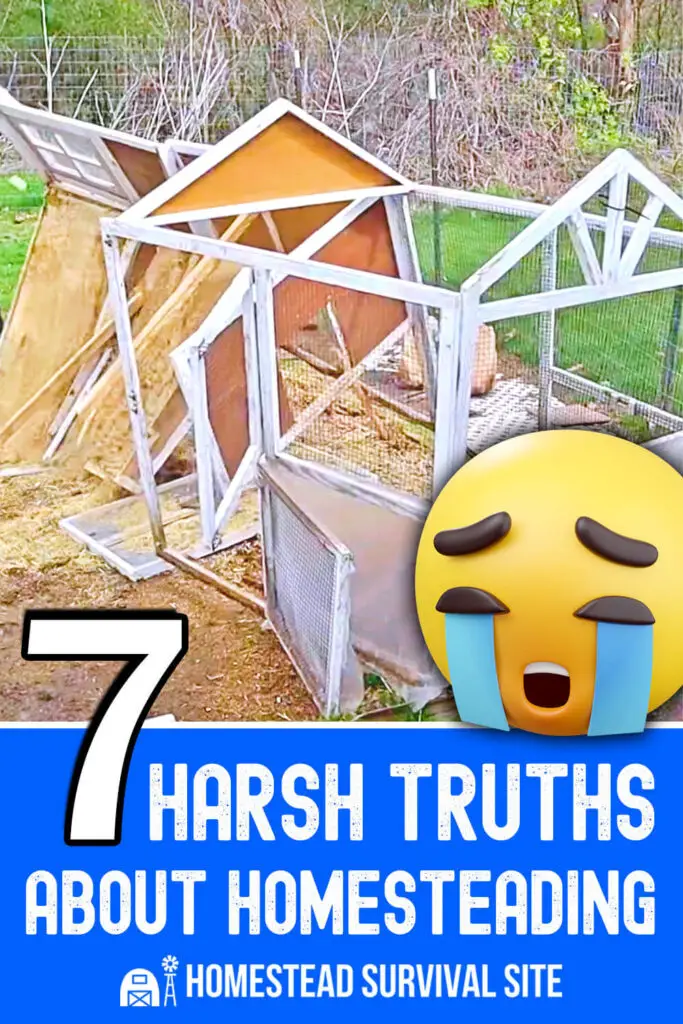Estimated reading time: 5 minutes
If you are thinking of homesteading or are just starting out, you may be seeking a way out of the typical consumer-driven lifestyle of the 21st century. You are willing to put your time, effort and money into a simpler, more self-sustaining way of life.
However, in order to be successful as a homesteader, you need to take off your rose-colored glasses and realize that homesteading requires hard work and dedication. Too many new homesteaders fail because they think a simpler life means an easier life. In many ways, you will be working harder than you ever have before.
The good news is that if it is the right lifestyle choice for you and your family, this hard work will be more than worth it. In the spirit of the old adage “forewarned is forearmed,” here are seven harsh truths about homesteading.
Want to save this post for later? Click Here to Pin It on Pinterest!
1. Homesteading Equals Long Hours And Hard Work
If you dream of saying goodbye to the old 9-to-5 regimen, just know that homesteading often involves long hours with less pay. The upside is that although you won’t be punching a time clock for someone else, you will be using mental and physical strength every day, seven days a week.
You will be at the whim of Mother Nature in many regards, and you will not be able to take significant time off unless you have someone you can trust to take over your work. You also will need to get up early in the morning and turn in relatively early at night in order to have the stamina to accomplish your daily tasks.
2. Homesteading Is Not For Dummies
In fact, there is a dramatic learning curve for beginners. Unless you grew up on a homestead, you will need to learn a myriad of new skills, ranging from carpentry to livestock raising.
You will need to learn about growing your own food and preserving that food. You will have to build fences and fix plumbing. Much of your education will be in the form of on-the-job training.
Want to start a homestead but not sure how?
Click Here to get a FREE book, "How To Homestead No Matter Where You Live."
3. You Won't Be Able To Do Everything Yourself
Despite your best intentions, you will not be able to raise all your own food, and you will not be able to handle every new situation without help. In time, you will learn how to provide many of your family’s needs, but no one homestead or one homesteader can provide everything.
You will need to build a network of like-minded individuals who will help each other out through barter, trade, and simple friendship. Work on finding a group of people you can learn from as you begin this adventure and then share with as you become more experienced.
Veteran homesteaders enjoy exchanging tips and advice they accumulated along the way, and you will build valuable contacts and friendships by learning from others. Attend workshops, trade goods and services, and ask questions.
4. Homesteading Costs Money
Yes, you will be learning and developing a frugal lifestyle. That is an essential part of homesteading. But, homesteading is not free. While you develop a sustainable income, you will need financial resources to pay taxes and purchase the equipment, services, feed, and other supplies you need.
Take things one step at a time. Begin with the basic needs of your family and do not exceed your income. You or your spouse may need to keep a traditional job until you establish other ways of providing income for your family.
Related: 30 Ways To Make Money With Your Homestead
5. Recordkeeping Is Essential
One of the reasons you are attracted to the homesteading lifestyle may be that it appears to have less stress than modern day-to-day life. However, you will not be worry-free if you do not learn from your mistakes.
Keep clear records of your expenses and your projects. Maintain a journal of what has worked and what has not worked in the way of profitability for your homestead. Learn from your mistakes and make adjustments accordingly.
6. Some Family Members And Friends Will Think You're Nuts
Get used to it. Some people you are close to will not embrace your new lifestyle choice. They may even try to talk you out if it. Your kids may even balk at the new lifestyle if it is radically different than what they know.
Instead of going on the defensive, stay focused and positive and try to surround yourself with supportive people who can help you achieve your goals.
Want to start a homestead but not sure how?
Click Here to get a FREE book, "How To Homestead No Matter Where You Live."
7. You Are Going To Fail At Some Things
And it may not be pretty. You may lose livestock. You may have a poor harvest. Your truck or your farming equipment may fail. You may run through your savings more quickly than you thought you would.
Homesteading is going to have its major ups and downs. By preparing for the worst and hoping for the best, you will maintain a healthy attitude.
Now that you have read some of these harsh truths about homesteading, you may be feeling a bit discouraged. Don’t be! When you talk with veteran homesteaders, you will realize that all of these potential drawbacks are worth it in the long run. It's even good for your health.
With some advance planning and forethought, and by learning from other homesteaders' mistakes, you will be able to weather through the initial rough periods of homesteading. Then, with each passing year, you will gain more experience and more confidence to handle the inevitable problems that come with the territory. And you will gain the satisfaction of living out a rewarding lifestyle that you enjoy.
Like this post? Don't forget to Pin It on Pinterest!



Finally true expectations too many people think that it is free to homestead. They just think that every thing and nature will always be a succeed but I can be a great help and reward. I am always looking to learn there is always something new to help coming around the corner and nobody knows everything.
I was looking for step by step procedures to preserve food
I am in the process of building a homestead on the less than an acre that I grew up on. I did not plan on no rain, 3 beautiful woodchucks, and who knows how many rabbits. Nearly all was lost. I decided that this year would be raised beds. Also, The good things that worked out were successful blueberry shrubs and an overgrown, but bearing red raspberry patch. I also have purchased black walnut for long term timber and a few nuts. Some perennial vegetables are in. We will see how they winter over.
I have been reading and planning and bracing for this spring.Next month I will be tapping sugar maples for the first time.
I homestead in the desert. If you want a challenge this is it. But about the sugar maple tapping, start talking and learn about it now. I had a farmer friend that had super shack for years. It is hard work and time consuming when it is time to boil down the maple. Good luck with it and keep the faith
Some people think homesteading is living all off grid and for young folks only.
My retired firefighter husband and I bought land in Oregon in 2004. We are now in our 70’s and only 5 yrs ago I bought fruit trees and planted my own orchard, put up fences, now raise 10 hens for eggs that I share with family and neighbors. Have two gardens and working plans to improve them.
I find that homesteading is a mindset, and a determination to raise your own or at least part of your own food, help you neighbors, maintain your property, use what you have, and have plans for improvement.
If you have a few chickens for eggs, you are homesteading, if you have a small vegetable garden, you are homesteading, if you look after your neighbor and share with them you are homesteading. If you maintain your homestead and share your knowledge with others you are homesteading.